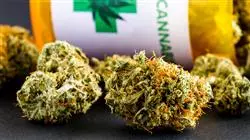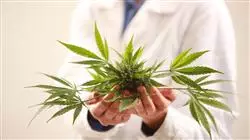University certificate
The world's largest faculty of medicine”
Introduction to the Program
This Postgraduate diploma is unique in that it offers physicians a multitude of techniques and tools so that they can approach cannabis addiction from a new perspective and treat it from a cognitive-behavioral psychology approach"

This Postgraduate diploma offers physicians a series of techniques and tools that will allow them to approach cannabis addiction from a new perspective. Aimed at professionals who wish to specialize in the field of cannabis addiction, or who want to update their knowledge in this regard, it offers the latest advances in the field of medical treatment in this area, so that they can intervene competently in this type of problem.
To this end, the teaching team of this program has made a careful selection of each of the topics of this program in order to offer the student the most complete study opportunity possible and always related to current events.
As it is an online program, the student is not constrained by fixed schedules or the need to move to another physical location, but rather, they can access the contents at any time of the day, allowing them to balance their professional or personal life with their academic life as they please.
Expand your knowledge through the Postgraduate diploma in Cognitive-Behavioral Intervention in Cannabis Addiction, in a practical way and adapted to your needs”
This Postgraduate diploma in Cognitive-Behavioral Intervention in Cannabis Addiction contains the most complete and up-to-date scientific program on the market. The most important features include:
- Development of clinical cases presented by medical experts
- The graphic, schematic, and practical contents with which they are created, provide scientific and practical information on the disciplines that are essential for professional practice
- Diagnostic and therapeutic developments in the intervention of cannabis addiction
- An algorithm-based interactive learning system for decision-making in the clinical situations presented throughout the course
- With a special emphasis on evidence-based medicine and addiction research methodologies
- All of this will be complemented by theoretical lessons, questions to the expert, debate forums on controversial topics, and individual reflection assignments
- Content that is accessible from any fixed or portable device with an Internet connection
Cannabis has become a commonly used substance by young people and people of all ages. That is why healthcare facilities increasingly require more and more physicians capable of treating these addictions"
The teaching staff includes healthcare professionals, who bring their work experience to this program, as well as renowned specialists from leading scientific societies.
Thanks to its multimedia content elaborated with the latest educational technology, this Postgraduate diploma will allow the professional a situated and contextual learning, that is, a simulated environment that will provide an immersive learning programmed to train in real situations.
The design of this program is based on Problem-Based Learning, by means of which the physician will have to try to solve the different professional practice situations that will arise throughout the Postgraduate diploma. To do so, it will have the help of an innovative interactive video system developed by recognized experts in the field of Cognitive-Behavioral Intervention in Cannabis Addiction and with extensive teaching experience.
The Postgraduate diploma includes real clinical cases and exercises to bring the development of the program closer to the physician’s clinical practice"

Don't miss this great opportunity to become a more competent physician and achieve job and salary improvements"
Why study at TECH?
TECH is the world’s largest online university. With an impressive catalog of more than 14,000 university programs available in 11 languages, it is positioned as a leader in employability, with a 99% job placement rate. In addition, it relies on an enormous faculty of more than 6,000 professors of the highest international renown.

Study at the world's largest online university and guarantee your professional success. The future starts at TECH”
The world’s best online university according to FORBES
The prestigious Forbes magazine, specialized in business and finance, has highlighted TECH as “the world's best online university” This is what they have recently stated in an article in their digital edition in which they echo the success story of this institution, “thanks to the academic offer it provides, the selection of its teaching staff, and an innovative learning method aimed at educating the professionals of the future”
A revolutionary study method, a cutting-edge faculty and a practical focus: the key to TECH's success.
The most complete study plans on the university scene
TECH offers the most complete study plans on the university scene, with syllabuses that cover fundamental concepts and, at the same time, the main scientific advances in their specific scientific areas. In addition, these programs are continuously being updated to guarantee students the academic vanguard and the most in-demand professional skills. In this way, the university's qualifications provide its graduates with a significant advantage to propel their careers to success.
TECH offers the most comprehensive and intensive study plans on the current university scene.
A world-class teaching staff
TECH's teaching staff is made up of more than 6,000 professors with the highest international recognition. Professors, researchers and top executives of multinational companies, including Isaiah Covington, performance coach of the Boston Celtics; Magda Romanska, principal investigator at Harvard MetaLAB; Ignacio Wistumba, chairman of the department of translational molecular pathology at MD Anderson Cancer Center; and D.W. Pine, creative director of TIME magazine, among others.
Internationally renowned experts, specialized in different branches of Health, Technology, Communication and Business, form part of the TECH faculty.
A unique learning method
TECH is the first university to use Relearning in all its programs. It is the best online learning methodology, accredited with international teaching quality certifications, provided by prestigious educational agencies. In addition, this disruptive educational model is complemented with the “Case Method”, thereby setting up a unique online teaching strategy. Innovative teaching resources are also implemented, including detailed videos, infographics and interactive summaries.
TECH combines Relearning and the Case Method in all its university programs to guarantee excellent theoretical and practical learning, studying whenever and wherever you want.
The world's largest online university
TECH is the world’s largest online university. We are the largest educational institution, with the best and widest online educational catalog, one hundred percent online and covering the vast majority of areas of knowledge. We offer a large selection of our own degrees and accredited online undergraduate and postgraduate degrees. In total, more than 14,000 university degrees, in eleven different languages, make us the largest educational largest in the world.
TECH has the world's most extensive catalog of academic and official programs, available in more than 11 languages.
Google Premier Partner
The American technology giant has awarded TECH the Google Google Premier Partner badge. This award, which is only available to 3% of the world's companies, highlights the efficient, flexible and tailored experience that this university provides to students. The recognition as a Google Premier Partner not only accredits the maximum rigor, performance and investment in TECH's digital infrastructures, but also places this university as one of the world's leading technology companies.
Google has positioned TECH in the top 3% of the world's most important technology companies by awarding it its Google Premier Partner badge.
The official online university of the NBA
TECH is the official online university of the NBA. Thanks to our agreement with the biggest league in basketball, we offer our students exclusive university programs, as well as a wide variety of educational resources focused on the business of the league and other areas of the sports industry. Each program is made up of a uniquely designed syllabus and features exceptional guest hosts: professionals with a distinguished sports background who will offer their expertise on the most relevant topics.
TECH has been selected by the NBA, the world's top basketball league, as its official online university.
The top-rated university by its students
Students have positioned TECH as the world's top-rated university on the main review websites, with a highest rating of 4.9 out of 5, obtained from more than 1,000 reviews. These results consolidate TECH as the benchmark university institution at an international level, reflecting the excellence and positive impact of its educational model.” reflecting the excellence and positive impact of its educational model.”
TECH is the world’s top-rated university by its students.
Leaders in employability
TECH has managed to become the leading university in employability. 99% of its students obtain jobs in the academic field they have studied, within one year of completing any of the university's programs. A similar number achieve immediate career enhancement. All this thanks to a study methodology that bases its effectiveness on the acquisition of practical skills, which are absolutely necessary for professional development.
99% of TECH graduates find a job within a year of completing their studies.
Postgraduate Diploma in Cognitive-Behavioral Intervention in Cannabis Addiction
Nowadays, cannabis addiction has become a public health challenge that requires highly qualified professionals to effectively address this problem. At TECH Global University, we are committed to educating experts in the field of mental health, and for this reason we have developed our Postgraduate Diploma in Cognitive-Behavioral Intervention in Cannabis Addiction, providing specialized education in the management of this addiction. Our program is conducted through virtual classes, which allows students to access the content from anywhere and at any time, adapting to their needs and schedules. Our virtual classes offer numerous benefits for students seeking training in cognitive behavioral intervention for cannabis addiction. Among the benefits is flexibility in study scheduling, allowing students to balance their studies with other professional or personal responsibilities. In addition, access to online study materials, as well as interactive platforms, promotes dynamic and participatory learning.
Study at the world's largest School of Medicine
TECH has a team of highly qualified faculty in the field of cognitive behavioral intervention and cannabis addiction. Students of the Postgraduate Diploma will receive a comprehensive certificate, based on the most recent scientific evidence, which includes the assessment, diagnosis and design of effective therapeutic interventions for the treatment of cannabis addiction. In addition, topics such as the psychopathology of addiction, specific cognitive-behavioral intervention techniques for this problem, relapse prevention strategies, and multidisciplinary teamwork will be addressed. At the end of the program, graduates will be highly qualified to effectively address cannabis addiction in various clinical and community contexts. The education received at TECH will enable them to become specialized professionals in the management of this problem, thereby contributing to improving people's quality of life and promoting their professional development in the field of mental health.







